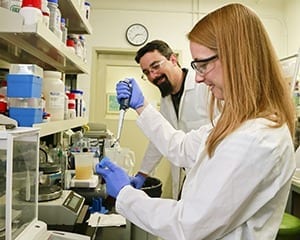
Biofuels pioneer Mascoma LLC and the Department of Energy’s BioEnergy Science Center have developed a revolutionary strain of yeast that could help significantly accelerate the development of biofuels from nonfood plant matter.
The approach could provide a pathway to eventual expansion of biofuels production beyond the current output limited to ethanol derived from corn.
C5 FUEL™, engineered by researchers at Mascoma and BESC, features fermentation and ethanol yields that set a new standard for conversion of biomass sugars from pretreated corn stover—the non-edible portion of corn crops such as the stalk—converting up to 97 percent of the plant sugars into fuel.
Researchers announced that while conventional yeast leaves more than one-third of the biomass sugars unused in the form of xylose, Mascoma’s C5 FUEL™ efficiently converts this xylose into ethanol, and it accomplishes this feat in less than 48 hours. The finding was presented today at the 31st International Fuel Ethanol Workshop in Minneapolis.
“The ability to partner the combined expertise at Mascoma and BESC in engineering microbes to release and convert sugars from lignocellulosic biomass has greatly accelerated the translation of basic research outcomes to a commercial product,” BESC Director Paul Gilna said.
Gilna noted that this success and continued efforts through BESC could go a long way toward reducing the cost of ethanol and growing the number of commercial-level ethanol production plants. A key focus of BESC is to use basic research capabilities and expertise to validate the consolidated bioprocessing approach to improve cost competitiveness.
“Driving down the cost to develop, verify and consolidate bioprocessing was at the heart of the BESC effort when we began in 2007, and this achievement allows us to advance to the next challenge,” Gilna said. “This accomplishment represents a clearly impactful example of how our partnering with industry can accelerate the translation of our research capabilities and findings into commercial products.”
Although cellulosic biomass such as corn stover, wheat straw and bagasse (the fibrous remains after sugar is extracted from sugarcane or sorghum) is abundant and cheap, because of recalcitrance — a plant’s resistance to releasing sugars for conversion to alcohol – it is much more difficult to utilize than corn. However, Mascoma’s new strain of yeast, which is one of many strains Mascoma developed as part of BESC over the last two years, proved highly effective at xylose conversion.
While most processing methods simply convert cellulose to sugar, this new approach also converts hemicellulose, which significantly increases overall sugar yield and thereby increases the level of ethanol produced. In fact, the new strain of yeast simultaneously yields 97 percent conversion of xylose and glucose—and does so in a significantly shorter period of time than existing approaches.
Read more: BESC, Mascoma develop revolutionary microbe for biofuel production
The Latest on: Engineering microbes for biofuel production
[google_news title=”” keyword=”Engineering microbes for biofuel production” num_posts=”10″ blurb_length=”0″ show_thumb=”left”]
via Google News
The Latest on: Engineering microbes for biofuel production
- This ‘living plastic’ breaks down all by itself, thanks to bacteriaon May 1, 2024 at 7:20 am
Researchers just created a biodegradable plastic using bacteria spores and thermoplastic polyurethane that could even benefit plants.
- Bacteria Engineered for Climate-Neutral Chemicals of the Futureon April 24, 2024 at 5:06 pm
Microbes are a kind of production platform into which biosynthesis modules can be inserted according to the “plug-and-play” principle.
- Engineered Bacteria: A Climate-Neutral Solution for Chemical Productionon April 24, 2024 at 11:56 am
Researchers transform bacteria to produce chemicals from renewable methanol, reducing reliance on fossil fuels ...
- Yeast Fuel, Developed by Chula's Faculty of Science Soon to Expand Its Production for the Aerospace Industryon April 23, 2024 at 9:27 am
Researchers from Chulalongkorn University have made use of forage grass to feed microorganisms and convert the resulting fat into jet fuel. They aim to expand petroleum-based oil replacement ...
- Bacteria for climate-neutral chemicals of the futureon April 23, 2024 at 9:02 am
Researchers at ETH Zurich have engineered bacteria in the laboratory to efficiently use methanol. The metabolism of these bacteria can now be tapped into to produce valuable products currently made by ...
- Yeast Fuel, Developed by Chula's Faculty of Science Soon to Expand Its Production for the Aerospace Industryon April 23, 2024 at 9:00 am
Researchers from Chulalongkorn University have made use of forage grass to feed microorganisms and ... development to scale up the production of aviation biofuel from yeast.
- Chula's Yeast Fuel to Expand Production for the Aerospace Industryon April 22, 2024 at 9:05 pm
Chula researchers use forage grass to feed microorganisms and convert the resulting fat into jet fuel aiming to replace petroleum-based energy and reduce impacts on human health and the environment BA ...
- Chula's Yeast Fuel to Expand Production for the Aerospace Industryon April 22, 2024 at 4:59 pm
Chula researchers use forage grass to feed microorganisms ... not been used for the industrial production of fat." "Using oleaginous yeast as a feedstock for biofuel production has several ...
- Engineering Bacteria to Produce Green Chemicals from Methanolon April 22, 2024 at 4:59 pm
To explore the potential of synthetic methylotrophs for the biotechnological production of industrially relevant bulk chemicals, Vorholt and her team have equipped the bacteria with additional genes ...
- Biomanufacturing isn’t cleaning up chemicalson April 21, 2024 at 5:00 pm
Biomanufacturing firms have long promised that engineering microbes to convert ... In 2015, Amyris started decreasing unprofitable biofuel production to focus almost entirely on higher-value ...
via Bing News










